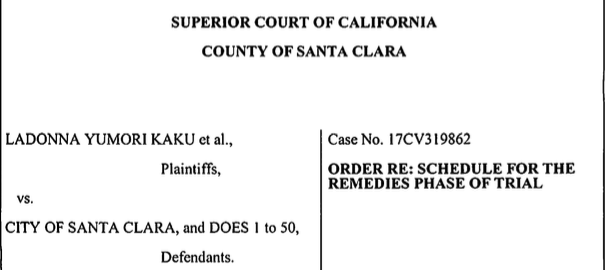On Monday, Santa Clara County Superior Court Judge Thomas Kuhnle issued an order about the remedy phase of the voting rights violation against Santa Clara that was originally filed a year and a half ago. Earlier this month Kuhnle ruled that the City violated the California Voting Rights Act.
The judge’s order requires the City to hold a series of community meetings in the next two weeks, publish announcements in the City’s two newspapers of record, area Spanish- and Asian-language media organizations and post notices in City Hall and City libraries.
“The court hopes and expects that the combination of additional public meetings in June and July,” Kuhnle wrote in his order, “and summaries of input received from the public …over the past seven years will assist the Court and the parties in drawing district lines.”
The judge also ordered the City to publish Hindi, Korean, Mandarin, Tagalog, Portuguese, Spanish, and Vietnamese translations of the notices on the SantaClaraCA.gov website, as well as minutes and video and audio recordings of the meetings.
The first meetings will hear from the community for input about possible single-member district boundaries on July 3 and 5. The second two meetings — July 14 and 16 — will present proposed district maps. The final decision will be made by the court, which has agreed to consider an interim solution for the November election, while it considers a final election district map.
Santa Clara’s lawyers, however, appear to believe that the order can be sidestepped.
Instead of taking a cooperative position the City has taken an adversarial stance. At Tuesday’s Council meeting, City Attorney Brian Doyle said that the City will appeal the judge’s ruling.
The City’s brief, also filed on Monday, opposing the judge’s order told the judge that any injunction on his part to stop the November election would be automatically stayed by an appeal — which they claim would be upheld because the plaintiffs “cannot demonstrate likelihood of success on the merits … because they cannot draw a majority-minority district of Asian-American.”
Further, “The balance of hardships weighs heavily against an injunction” because “the rights of potential minority candidates would be harmed by the massive confusion sowed by such a haphazard process.”
This was endorsed by declarations included in the brief by Hosam Haggag and Tino Silva — members of the Charter Review Committee that conceived the failed Measure A and active campaigners for the Measure — as prospective City Council candidates.
This provoked a sharp response from Judge Kuhnle, who reiterated his order Tuesday morning.
“The Court was surprised by the City’s comments…The City did not provide constructive suggestions on how the proposed schedule might be improved. Instead, the … comments suggested it would be impossible to hold public meetings on such short notice, and that any attempt to order the City to comply with Elections Code section 10010 could be immediately appealed, and as a consequence, the City could not be ordered to do anything.
“Instead,” he continued, “of making best efforts to ensure the November 2018 elections comply with the California Voting Rights Act, the City submitted comments that described how the City might bring those efforts to a halt.”
The judge can stop an election by a method he’s ruled to be a violation of California law by refusing to certify of the results of any election, thereby effectively stopping the election. This’s what happened in Palmdale in 2013.
A Los Angeles County Superior Court issued a preliminary injunction against certifying Palmdale’s 2013 election results. Three years and more than $4 million later, Palmdale held single-member district elections. The case showed, wrote municipal attorney Thomas Rice in PublicCEO.com, “the range of remedies, and overall power courts have in these cases.”
Judge Kuhnle concluded his comments by reiterating his previous order with a detailed schedule for compliance.
The City Council’s preferred plan for developing a district map, discussed at Tuesday’s City Council meeting, is to re-convene the committee that proposed Measure A and to hire the demographer that did the 2011 study that has been used to bolster the City’s argument that minority-majority election districts would be impossible because Santa Clara has a homogenous population.
The next hearing on the case will be July 23 at 9 a.m. Judge Kuhnle said he expects to make a final decision by August 3. Information about Case #17CV319862 is at scscourt.org/online_services.shtml.






